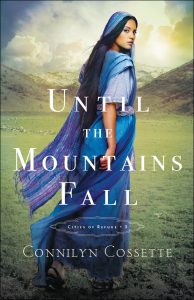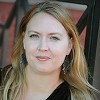What kind of research did it take to get the details right?
 I always start with the Bible as the framework for whatever I write. I want to do my best to keep the Word as the foundation of my books, regardless of the many contradictions and disagreements between scholars and archeologists.
I always start with the Bible as the framework for whatever I write. I want to do my best to keep the Word as the foundation of my books, regardless of the many contradictions and disagreements between scholars and archeologists.
Then I spend a lot of time trying to understand the world in which my characters would have lived so I devour any books or articles on the culture and settings that I can find. There is so much information out there on the internet and so many new finds that are coming out of Israel that I do tend to get lost on rabbit trails, but you never know what I’ll use in future books!
I am a member of a couple of archeological and academic sites, so I sift through those to help flesh out my understanding of the material culture as I begin to plot the stories. Then as the book develops, I am always looking for interesting details to weave into specific scenes.
I’ve used YouTube to help me learn how to make bronze weapons, bows and arrows, and prepare food and cloth in ancient ways. I’ve scoured the internet for recipes using ingredients that likely were available in that region in that time period. I’ve searched out weather patterns, harvest cycles, and historical changes in Israel’s climate and deforestation.
Google Earth is an invaluable tool for exploring terrain. But I was also really blessed to travel to Israel in 2017, while I was editing the first book, so I was able to see some of the settings with my own eyes and to experience the sights, sounds, tastes and smells of the Land itself.
Research is something I never tire of since I’m a history nerd at heart, but my methods and resources are always evolving. The longer I study the ancient past the more I have come to realize that we have only begun to scratch the surface of true understanding of the people that came before us.
What spiritual themes or ideas run through Until the Mountains Fall?
This book is a twist on the Prodigal Son parable told by Jesus, but instead of a son walking away from his home it is a daughter who rebels against an arranged marriage and foolishly chooses to make her own way. As I wrote the Cities of Refuge Series I began to see these cities as a place of safety, tended to by the “pastors” of the day which were the Levites, and places where sinners were embraced, taught the Word, and cared for until the death of the High Priest set them free (just like Jesus) which is a really great foreshadowing for the mission of the Church.
Since I was once a Prodigal Daughter who turned my back on my spiritual heritage and my parents’ wise council for a short while, I was inspired to write the story of a young woman who recklessly chooses her own path and finds herself metaphorically “eating with the pigs.”
While the details of my prodigal journey are not the same as Rivkah’s, the spirit of her rebellion, transformation, and return home certainly is. And like the rest of the books within the Cities of Refuge Series, Until the Mountains Fall also explores the theme of Yahweh’s perfectly balanced justice and mercy.
Tell us about Rivkah and Malakhi. What made you want to tell their story?
 When I decided to write this story as a prodigal daughter tale, my greatest challenge was to develop Rivkah’s character in a way that depicted her self-centered nature while also instilling a sense of empathy for a hurting and broken girl. Readers who are familiar with the younger son in Jesus’s parable remember that he is headstrong, rebellious, self-centered, and reckless.
When I decided to write this story as a prodigal daughter tale, my greatest challenge was to develop Rivkah’s character in a way that depicted her self-centered nature while also instilling a sense of empathy for a hurting and broken girl. Readers who are familiar with the younger son in Jesus’s parable remember that he is headstrong, rebellious, self-centered, and reckless.
Therefore, even though Rivkah has grown up under the protection and provision of her loving father, her bitterness has twisted her perception of his motives into something they are not and she has forgotten all the blessings of living within the safety of the city of refuge, deciding that the grass must be greener elsewhere.
But as readers experience Rivkah’s transformation from selfish and obstinate to self-sacrificing and repentant my hope is that they will be reminded that while all of us are sinners and prone to wander we have a good and faithful father who is always waiting with arms open wide, calling us home.
As the son of a convicted manslayer, Malakhi has also grown up in Kedesh but has experienced things a little differently than Rivkah. He has a tendency to be a little bit idealistic at first and puts Rivkah on a really high pedestal, which of course she topples from in spectacular fashion. His own wounds are tied up with his guilt over what happened to his older brother and when the very thing he used to cope with those hurts is stripped away, he has some difficult decisions to make.
Like Malakhi, we all have to learn to let go of failed expectations, to forgive, and to choose mercy and I hope that readers will find a connection with his journey as well. I chose to tell this story because there are echoes of my own struggles within both Rivkah and Malakhi and found the writing of this book to be a good reminder to myself of all the lessons I learned when I was a prodigal child and how vast and deep the love of my Father is for me.
Click through to discover the challenges of balancing historical accuracy with the needs of the story…


